How does Sixdegree use onchain quests by RabbitHole to help protocols distribute their tokens efficiently?
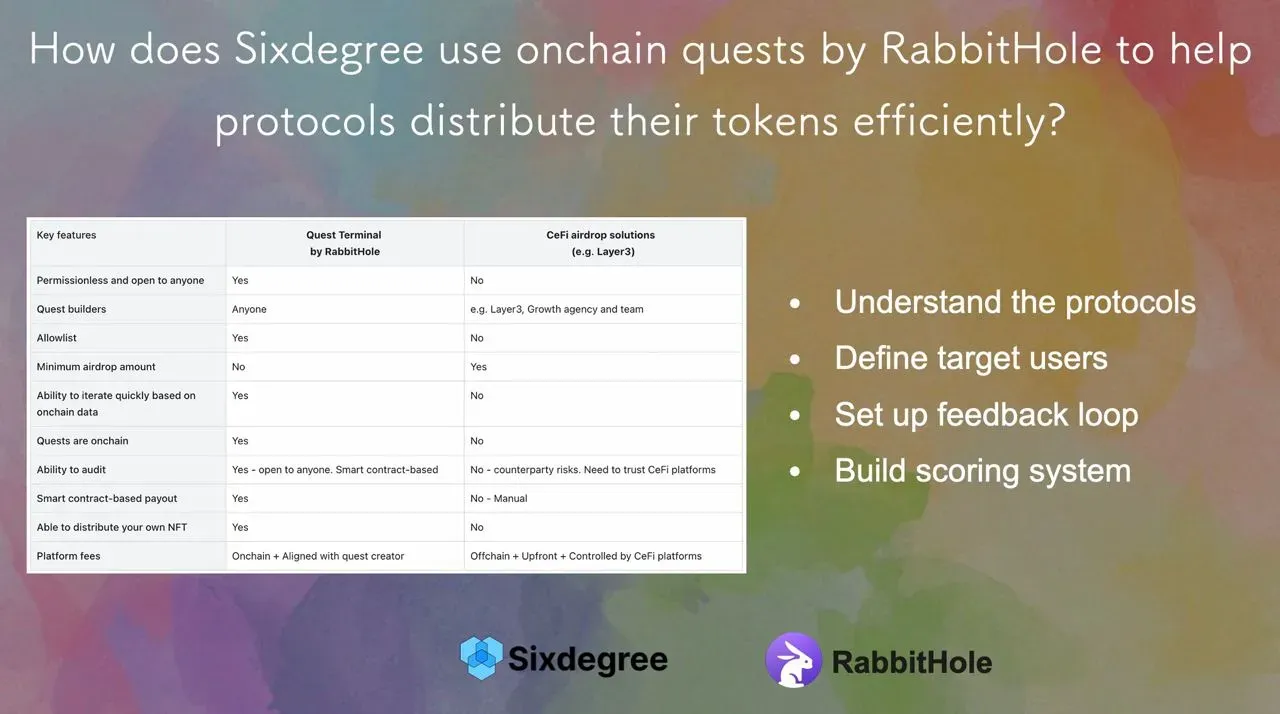
Who is Sixdegree Lab? We are a team of onchain data analysts ranked No. 1 on Dune Analytics and have a track record of working with 20+ top protocols (Lens, ParaSwap, Gnosis Safe etc..). We support protocols in their airdrop and token distribution and in their broader data strategies. Contact us at [email protected] or on Twitter at https://twitter.com/SixdegreeLab
What is RabbitHole Terminal? RabbitHole is a platform for users to see what earning opportunities they're eligible for from Quest Protocol. RabbitHole recently introduced "Quest Terminal" , which makes it easy to target & deploy quests to the quest protocol and get distribution through RabbitHole and other partners https://RabbitHole.gg/
Summary
- We are still in the early phase of measuring airdrops by CAC & LTV, as onchain revenue is required to have effective token distribution and it is currently difficult to create a successful quest that is not focused on vanity metrics if there are no onchain revenues.
- However, token incentives do offer fantastic tools to help bootstrap new networks and have gone through multiple iterations including liquidity mining, long term vesting token design and airdrops.
- As the crypto ecosystem is maturing and user growth has slowed down, protocols have had to adapt and to leverage data-driven strategy for their growth.
- Sixdegree believes that airdrops not only benefit new projects in addressing the cold start problem, but also serve as a valuable tool for existing projects during their iterative growth phases.
- Some successful airdrop platforms are already out there, such as Layer3, Galxe, etc. However, considering SixDegree specific constraints including using onchain data to iterate quickly and open source technology, these platforms did not meet Sixdegree expectations.
- A prime example of this new data-driven strategy includes the rise of onchain quests invented by RabbitHole defined as airdrop with recurring distributions, conditional claiming, and retrospective eligibility requirements.
- Onchain quests core features allow protocols to assure effective token distribution while reducing some of the key challenges that traditional quests airdrop platforms face, including Sybil farmers, sustainability and efficiency.
- Note, Airdrop farmers are not always a bad thing for protocols as some of these users stay and others go. Our view is to support protocols in reducing the amount of mercenary farmers who are only there for reward and then leave.
- In line with our data-driven objectives, SixDegree wanted to shed some light on how we think about onchain quest design, including: rapid feedback loop, deep understanding of the protocol and scoring system.
- Sixdegree uses RabbitHole Terminal to launch onchain quests leveraging their smart contract-based execution solution with full transparency, composability including allowlists function and onchain data to easily iterate and test assumptions. RabbitHole has shown strong commitment to decentralise quests.
- Onchain quests give the opportunity for any onchain data wizards to build their own quests and support protocol growth via smart token distribution.
Token incentives or tools to bootstrap networks are becoming more data driven

- A16Z wrote a great article about how Web3 introduces a powerful new tool for bootstrapping networks: token incentives.
- However, token incentives are not a solution to all Web3 user acquisition problems but more a means to support the discovery phase required to bring early adopters to a new network.
- As we have entered the bear market, the overall user growth has slowed down and many projects are facing existential problems with their growth strategy.
- Back in the DeFi summer days, a protocol could launch a liquidity mining campaign without much data driven strategy and acquire customers and transaction volume.
- The combination of a fast growing crypto market combined with token incentives helped some of today's crypto protocols to cement their position as leaders.
- Today, the ecosystem is very different. It has become much more competitive to attract users and projects and simple liquidity mining does not work.
- Protocols are slowly moving to a more data-driven token incentives strategy based on clear KPIs and growth strategy rather than simple liquidity mining.
- Some early examples include retro-active aidrop by Optimism and the recent ParaSwap proposal with RabbitHole
Onchain Quest
Onchain quest is the latest airdrop design allowing protocols to offer recurring distributions, conditional claiming, and retrospective eligibility requirements
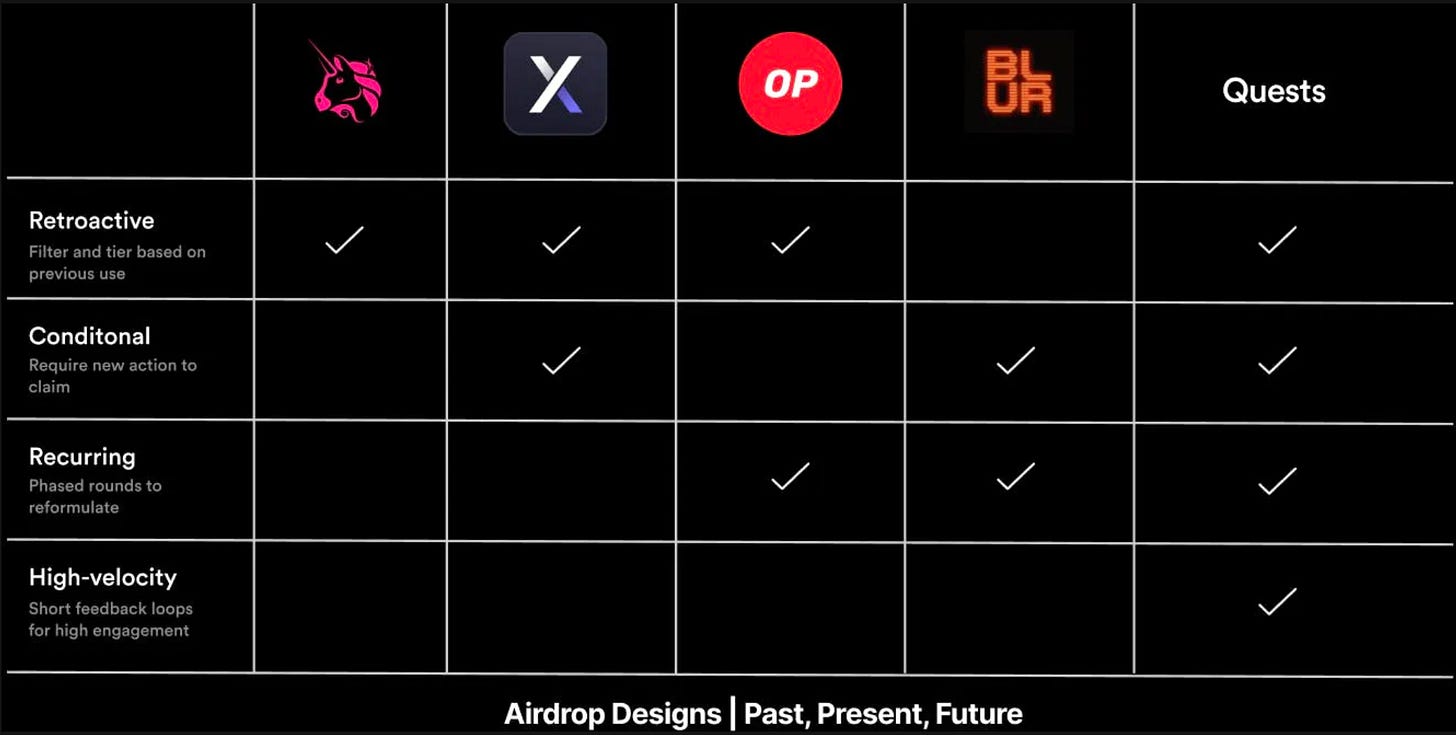
- Airdrop has become a captivating subject within crypto space as they serve as an incentive mechanism for distributing tokens to individuals who have participated in a network
- The team at RabbitHole wrote a great article about the development of Airdrop in "Airdrop Design | Past, Present, & Future" and how onchain quests are the latest iteration of airdrop.
- Onchain quests are defined as airdrop with recurring distributions, conditional claiming, and retrospective eligibility requirements.
We wanted to shed light on how onchain quests can solve the three main challenges of airdrop: Sybil farmers, sustainability and efficiency
Sybil farmers
- These individuals create multiple accounts with the anticipation of receiving future airdrops for each account and can represent up to 25% of an airdrop as seen with the HOP protocol.
- SixDegree believes that Sybil farmers have a role in the onchain ecosystem as early adopters of new applications. However, they also undermine the purpose of airdrops meant for users who genuinely want to contribute to the project's long term growth.
- Onchain quests help to incentive long term users and allow users to iterate on different mechanisms
Sustainability
- Airdrops have historically been one-time distributions with a significant amount of value, lacking the potential for ongoing rewards as well as potentially creating sell pressure from airdrop recipients.
- A recent example is the UNI airdrop which saw a substantial share of wallets dumping the UNI token.
- Onchain quests allow protocols to build long term incentive programs with data-driven iteration.
Efficiency
- Airdrop strategies often have a very slow feedback loop due to long duration and no onchain data limiting the opportunity for iteration and optimization before committing substantial resources.
- Recent iterations such as Odyssey (ie. campaign period for potential airdrops) have often led to user confusion and impatience mainly due to the lack of feedback during these lengthy periods.
- Onchain quests are fully onchain allowing teams to test assumptions and iterate quickly without having to wait multiple weeks
Highlights on how Sixdegree design onchain quests
- Sixdegree believes that airdrops not only benefit new projects in addressing the cold start problem, but also serve as a valuable tool for existing projects during their iterative growth phases.
- Our data analysis services, in order to effectively target users, we believe it will result in a strong user retention rate.
In line with these objectives, we have identified several key factors to consider when designing airdrop strategies:
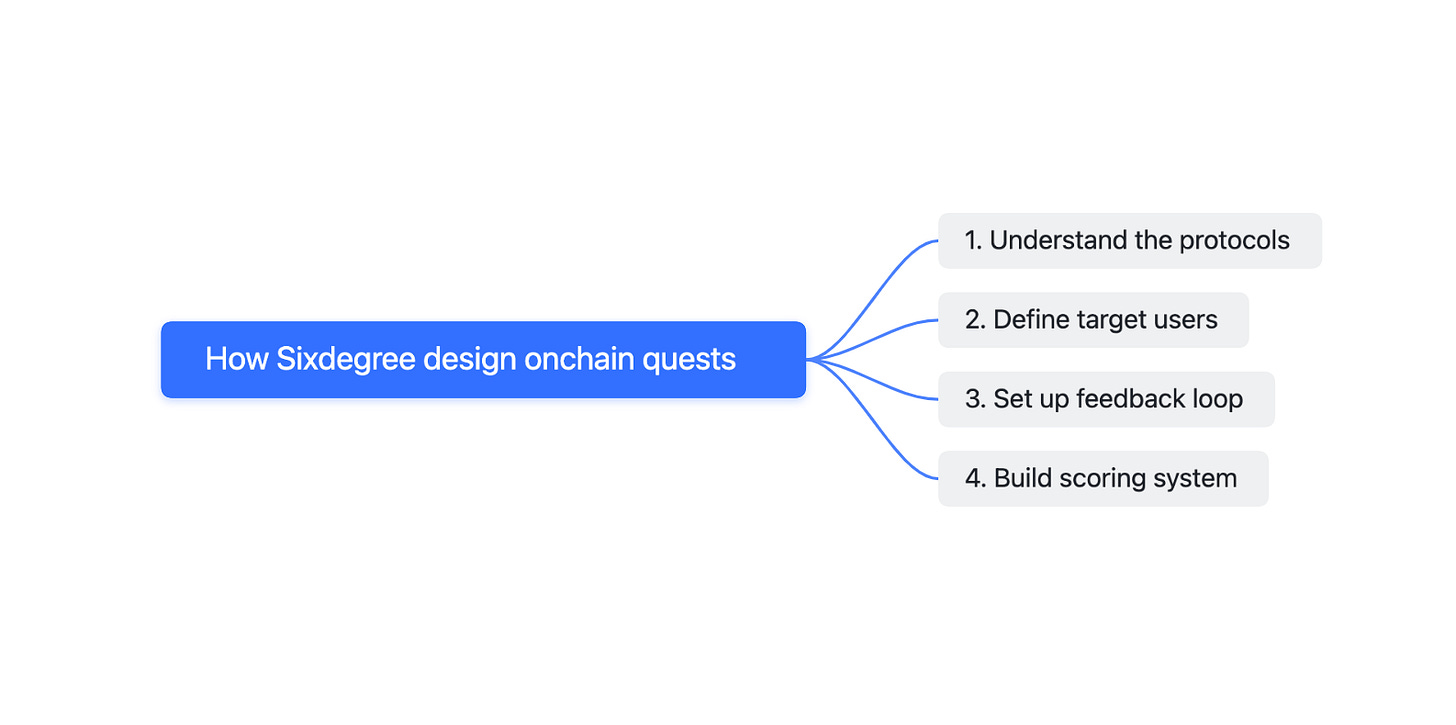
Understanding of the protocols
- The first step in the process of designing effective onchain quest campaigns is to have a comprehensive understanding of the protocols including peer review, product, smart contract and token design and user base.
Target users
- Each growth strategy may have different target users based on certain KPIs and growth factors.
Rapid feedback loops and iteration
- We use an iterative approach to allow for continuous improvement and ensures that users feel heard and valued.
Scoring system
- A scoring system is great way to assess the quality of each wallet and iterate on the different incentives based on long term usage.
Overview of key product features from onchain quest that led Sixdegree to adopt this design
- Some successful airdrop platforms are already out there, such as Layer3, Galaxe, etc. However, considering our specific constraints, these platforms do not meet our expectations.
- Sixdegree decided to use the Quest Terminal by RabbitHole, a platform allowing high-velocity experiments called “quests” and wanted to share some of the key product features that have led our decisions
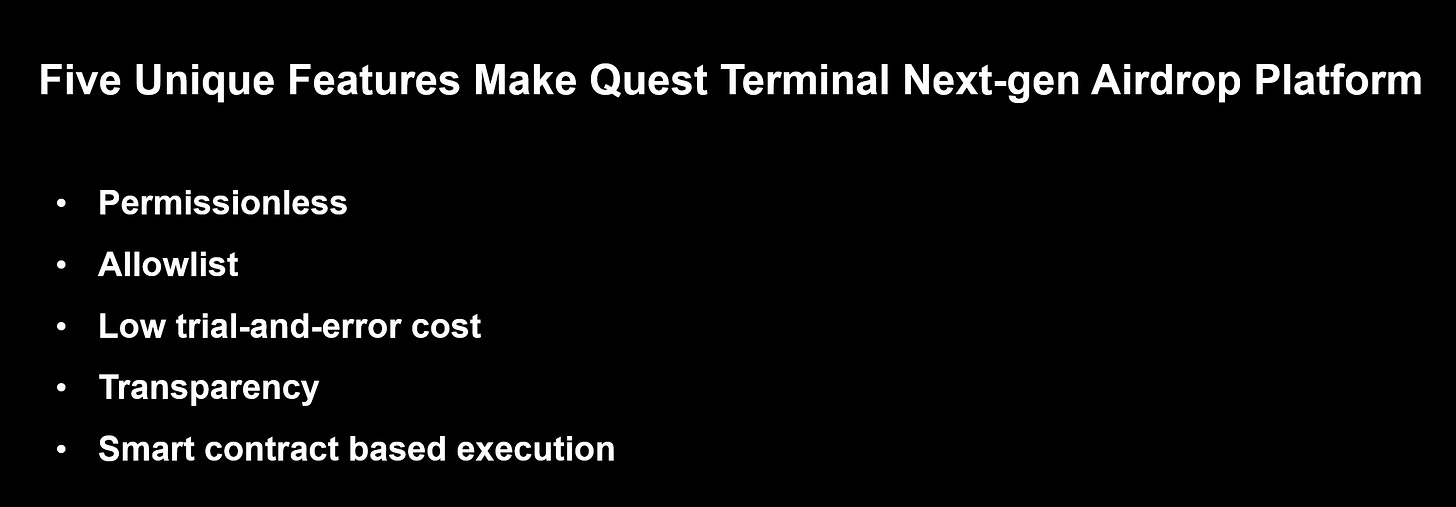
Permissionless
- Deploying quests on Terminal is permissionless and open to all, unlike existing closed platforms and is decentralised
- This allows data analysts, like Sixdegree, to audit quest results and directly deploy quests.
Allowlist
- Quest Terminal offers a feature that allows custom allowlists, enabling more precise targeting for quests.
- It opens opportunities to design quests that combat farming practices such as excluding newly-created wallets.
Low trial-and-error cost
- Retroactive airdrops, while useful, can be cumbersome and costly. Hence, a low-cost trial-and-error alternative is a great solution.
- Onchain quests are fully configurable and offer easy trial and error at low costs. For instance, protocols can deploy 20 different swap quests to 20 different allowlists, and see which one performs better or converts.
Transparency
- Quests are onchain as opposed to offchain on Layer3 making it much easier to conduct data analysis and audit the results of quests.
- Protocol can see detailed reporting on user composition, attributes of the action itself (e.g. average value swapped/bridged etc..)
Smart contract-based execution
- The execution of quest payouts for ERC20 tokens is seamlessly performed through a smart contract unlike platforms like Layer3, where the process is manually handled by the team, often resulting in campaigns based on "raffles or lotteries".
- Quest Terminal offers complete customization at the parameter level, such as minimum value, particular tokens, and other criteria.
Summary product comparison between Quest Terminal and CeFi airdrop solution :
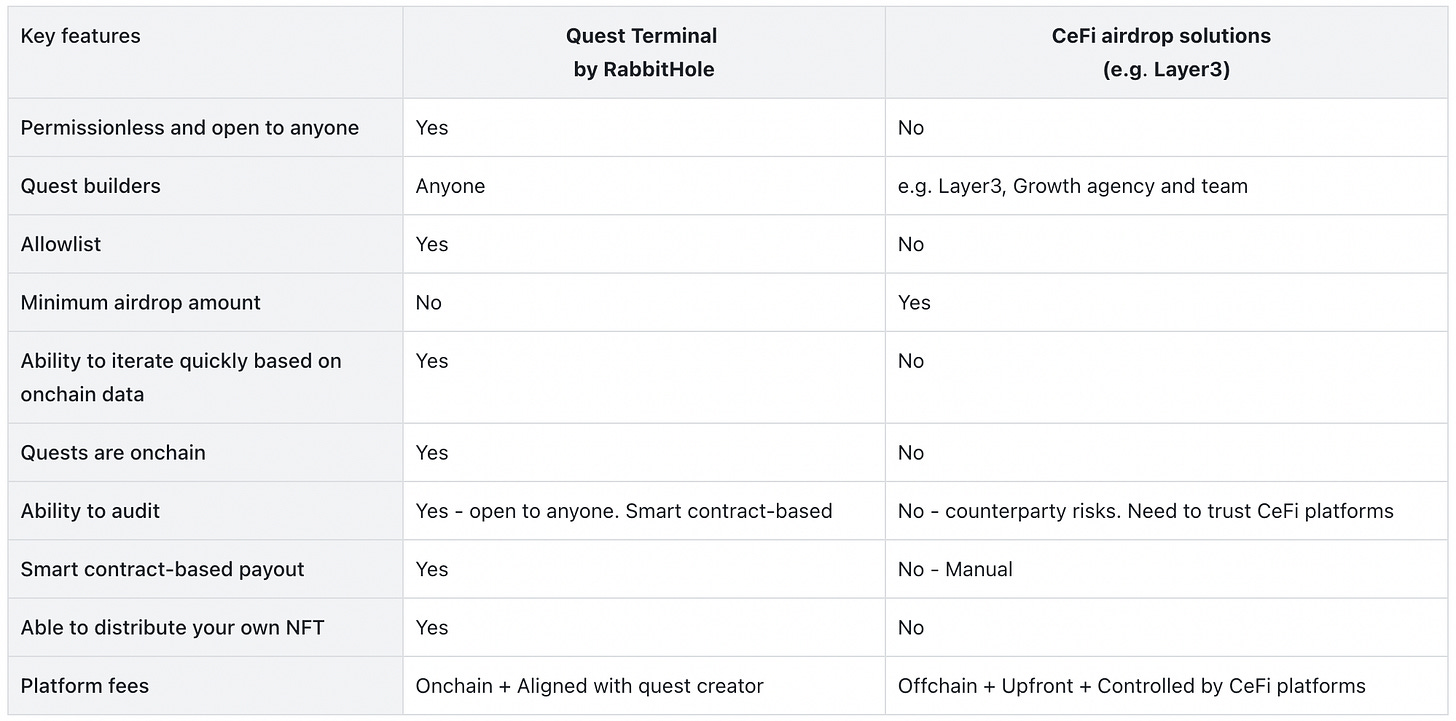
Contact
You can contact us via
- Email: [email protected]
- Twitter: https://twitter.com/SixdegreeLab
- Telegram: https://t.me/oxgummy